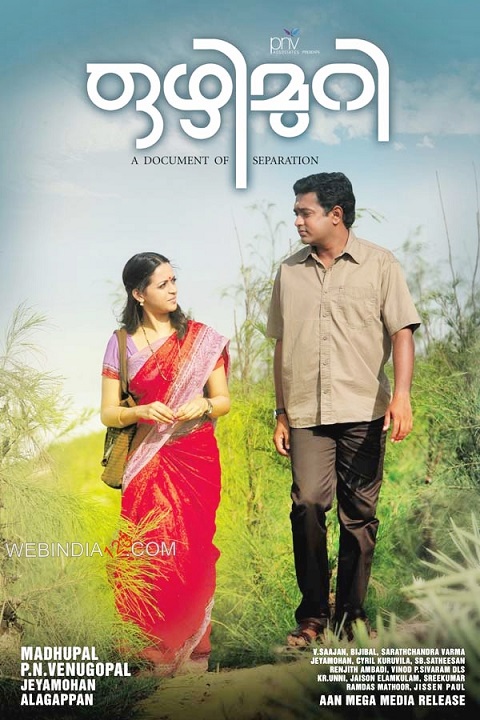Ozhimuri
While people are aware of popular movies from Malayalam New Wave Cinema like Usthad Hotel and Bangalore Days, not many are aware of this gem called Ozhimuri.
I have always been fascinated with Malayalam cinema and the rawness the characters have in them. It’s pure and real emotion, straight from the heart! And Ozhimuri is no exception.
The Malayalam movie ‘Ozhimuri’ begins with a 55-year-old woman, Meenakshi Pillai, played by Mallika, filing for a divorce after being in a marriage for 30 years with her 71-year-old husband Thanu Pillai. She is in the court to demand ‘Ozhimuri’ which means a document of separation in both Tamil and Malayalam. The movie, quite appreciated among critics but a commercial failure, is an interesting commentary on the practice of ‘Marumakkathayam’, a practice of property inheritance through female lineage in the Nair community of Kerala. The practice declined in the second half of the 20th century due to opposition by the male population.
Being from Kerala myself, I was surprised that I wasn’t aware of the Matrilineal history of the Nair community and got to know about it only after watching Ozhimuri. This story is a slice of forgotten history of Matriliny in Kerala. It is based on the story of the book ‘Uravaidangal’ by the writer Jeyamohan.
The movie is set in a Southern village in Kerala(the erstwhile Southern Travancore) with a mix of Tamil and Malayalam speaking population. Movie is primarily in Malayalam with a mix of Tamil dialogues here and there. Both Meenakshi Pillai and Thanu Pillai are old, and the counsels find the case amusing. Thanu Pillai’s case is defended by Advocate Balamani, played brilliantly by Bhavana. They slowly try to understand the events that lead to Meenakshi seeking Ozhimuri. What follows is a battle of words, a clash of egos and intense emotional narratives. The movie switches between flashbacks from Meenakshi and Thanu Pillai’s life and present-day conversations and a gradual romance between Balamani and Sarath Chandran, Meenakshi and Thanu’s son played by Asif Ali. Balamani encourages Sarath to persuade his mother to take back the case, as it could take “twenty years or more”. Meenakshi, however is adamant and asserts her point that even if it takes 20 years, she wants to die as an independent woman. For Balamani, it is difficult to comprehend the fact that a son is supporting his mother in her divorce case. It is not until later that Sarath narrates his story and the trauma and abuse he and his mother faced while growing up, at the hands of Thanu Pillai. However, Sarath and Meenakshi aren’t the only ones who have faced abuse. Thanu Pillai, played by Lal, has his own childhood trauma to deal with, which has resulted in him being bitter and resentful towards women. Thanu Pillai’s mother left his father (also played by Lal), to live with a younger man. In those days, women enjoyed freedom in the Nair community and were free to divorce their husbands. For me, the highlight of the movie was Thanu Pillai’s mother Kali Pillai, played amazingly by Shweta Menon who gives one of the best performances of her career. Kali Pillai belonged to a family which followed Matrlineal succession and hence, she hands over the family property to her daughter in law Meenakshi. Even though Meenakshi is from a poor family, Kali Pillai loves her and repeatedly tells her to take a stronger stand towards her husband instead of submitting to patriarchy. Meenakshi being submissive, signs off the property to Thanu Pillai on his persuasion. Thanu Pillai has begun to hate the matrilineal system so much that he has started resenting women and hence, married a woman whose family follows the patriarchal system. Meenakshi is now demanding Ozhimuri along with the property she handed over to Thanu Pillai.
We see the movie through the perspectives of these characters. The three main characters being women from three different generations. Kali is a strong matriarch and a force not to be messed with, she single handedly beats her tenant with a plant she uproots with a single hand. Her character who has been rightly named, Kali (the goddess of destruction) is a stark contrast to Meenakshi, who has been submissive all her life. In one scene, she even mocks Meenakshi on being “like a cat”. Somewhere in between is Balamani, who ignores casual sexism, is independent and a strong lawyer, yet persuades Sarath to repeatedly ask his mother to take back the case as it would be shameful for them and will take years. “One day in our life is equivalent of one year in court”, she remarks. In another scene she says, “Every husband abuses his wife in this land, so should all couples file for a separation?”. Performance wise, its Shweta Menon who blows your mind. She exudes anger, her open hatred for patriarchy, and her vulnerability and desire to see her son for the last time before dying, with an effortless transition. She manages to scare with her eyes. Lal is brilliant as the frustrated Matriliny -hating Thanu Pillai, who mercilessly beats his wife and kid, yet it is revealed later that he truly loved Sarath. Bhavana proves her mettle as an actress and Mallika beautifully captures the silent, submissive, and resilient nature of a woman who has suffered abuse for 30 years.
The movie is just about 120 minutes long and the screenplay is top notch, and the events gradually build up. You realize that every character has something to say. A lava waiting to explode at the opportune moment! The movie could have done without the romantic angle between Sarath and Balamani. The movie was an official selection for the Indian Panorama section of the 43rd International Film Festival of India. It is widely regarded as one of the essential movies of the Malayalam New Wave. Surprisingly, not many are aware of this gem.
Madhupal meticulously builds the canvas with breath taking backwaters, coconut trees, the traditional, ancestral Kerala houses, and the characters from everyday life whom you meet sipping tea on the streetside local tea shop. These are people dressed in the traditional ‘Veshti’ and clothes which you and I wear in our daily lives. The realism is unmatchable, but realism is something you sign up for when you watch content-driven Malayalam movies. Despite going back and forth in its timeline, Ozhimuri builds a tight narrative through its characters. The emotions are raw, real, and never over the top unless required. Overall, it’s a must watch for the lovers of Malayalam cinema and who are not aware of this side of its Matrilineal history. Give it a go and you won’t regret it.
You can watch Ozhimuri for free on MX Player.
Disclaimer: The above review solely illustrates the views of the writer.




